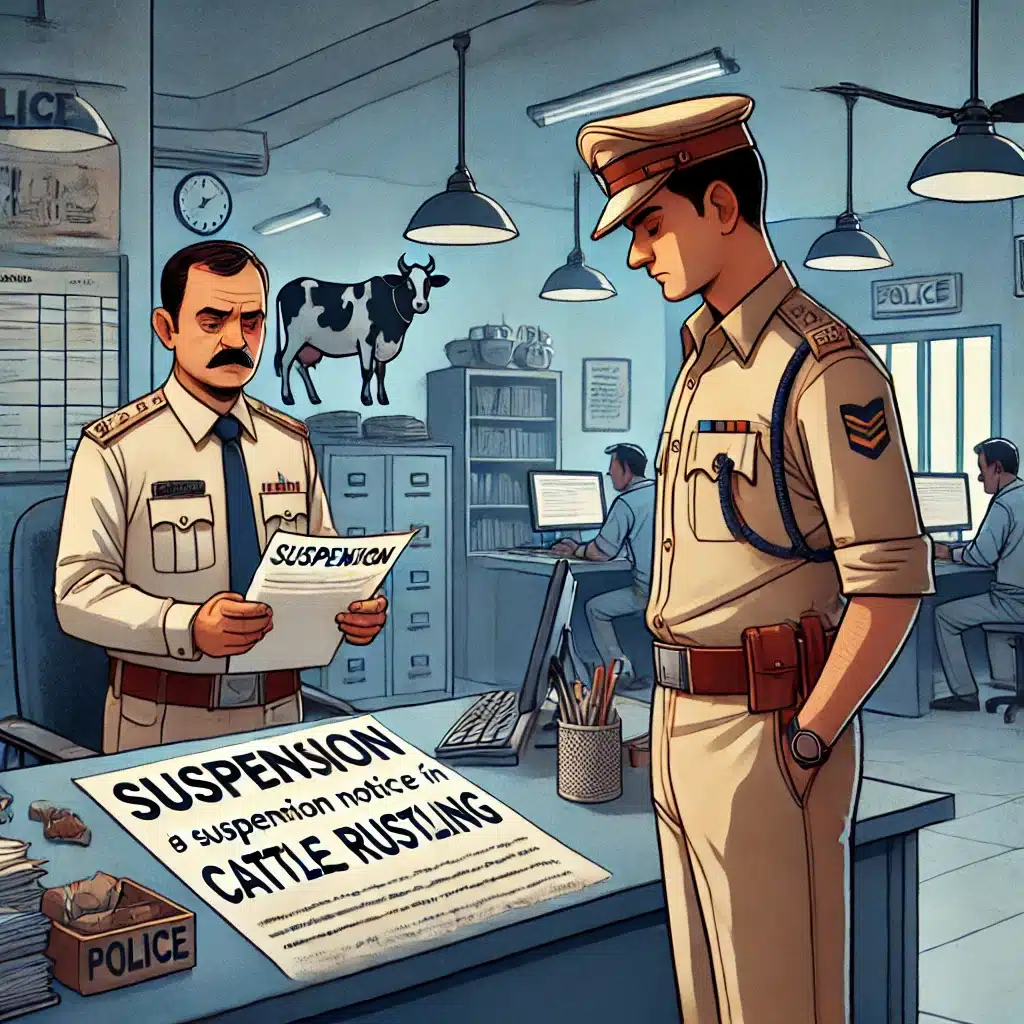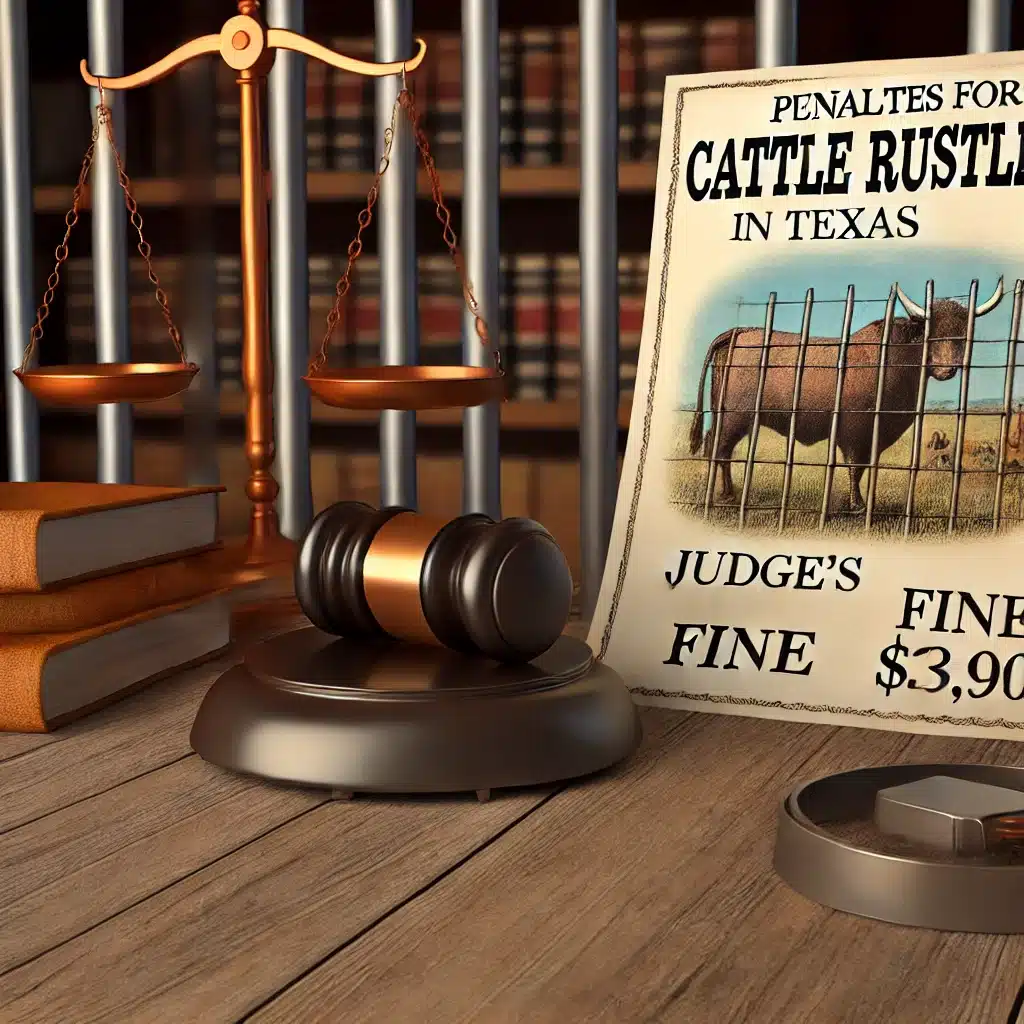Cattle rustling, a crime woven into the legends of the American West, refers to the theft of livestock for profit. During the 1800s, when the cattle industry flourished and herds roamed freely across open ranges, rustlers exploited weak property laws and limited law enforcement. Taking advantage of the vast, unregulated frontier, they would steal cattle and sell them under false ownership, making cattle rustling one of the most notorious crimes of the era.
In modern times, cattle rustling still significantly impacts ranchers, but the methods have evolved. Today’s rustlers use trucks and trailers instead of horses. They exploit technological tools to alter or remove identifying marks. These marks include ear tags or brands. This evolution in tactics has made it more challenging for law enforcement to track and apprehend these criminals. The motivation remains the same: profit. With cattle values high, theft can be lucrative for those willing to take the risk.
The impact of cattle rustling extends beyond the immediate loss of livestock. For ranchers, the theft of cattle can represent a significant financial blow, affecting their livelihoods and the local economy. Stolen cattle are often part of carefully managed breeding programs, representing years of investment and effort. The loss can also disrupt the beef industry supply chain, affecting prices and market availability.
To combat cattle rustling, law enforcement and ranchers have employed various strategies. These include improved surveillance techniques like drones and GPS tracking. They also use more sophisticated methods of marking and identifying cattle. Collaboration between ranchers, law enforcement, and livestock associations has increased to share information and resources.
Despite these efforts, cattle rustling remains challenging to prevent and prosecute. The vast expanses of rural land where cattle are raised make surveillance difficult. The transient nature of the crime complicates law enforcement efforts.
Who Is Leroy Medlin?
Leroy Medlin is a figure who has come to public attention due to his involvement in a cattle theft ring in West Texas. This involvement has led to his indictment and arrest. His story is complex, marked by a series of professional setbacks and legal troubles. These issues have unfolded over the years.
Medlin’s career in law enforcement began with promise but was quickly marred by controversy. During his five-year tenure with the San Antonio Police Department (SAPD), he accumulated three indefinite suspensions, which is the department’s equivalent of being fired.

The Three Indefinite Suspensions
Leroy Medlin is a figure who has come to public attention due to his involvement in a cattle theft ring in West Texas. This involvement has led to his indictment and arrest. His story is complex, marked by a series of professional setbacks and legal troubles. These issues have unfolded over the years.
First Suspension: Vehicle Pursuit
The first indefinite suspension that Medlin received was in 2015, following an unauthorized vehicle pursuit. This incident began as a routine traffic stop, but when the suspect fled, Medlin initiated a chase. Initially, he reported over the radio that the suspect had a felony warrant, which would have justified the pursuit. However, after the chase was called off by a supervisor, Medlin’s account changed; he claimed over the radio that he could not verify the suspect’s identity. This inconsistency suggested that Medlin had not been truthful in his initial transmission. During the pursuit, Medlin observed a toddler in the back seat of the suspect’s vehicle. He continued the high-speed chase, reaching speeds up to 101 mph. This decision showed a disregard for the safety of the child and the public. The SAPD’s review concluded Medlin had failed to exercise sound judgment. He had violated the department’s pursuit policy.
Second Suspension: Unattended Prisoner
Medlin’s second indefinite suspension was related to an incident that occurred in September 2014. In this case, Medlin left his assigned district without authorization and left a female juvenile prisoner unattended in his patrol vehicle for an extended period. This breach of protocol was compounded by the fact that he left the juvenile to pursue another individual on foot, which not only violated department policy but also exposed the juvenile to potential harm. Initially, this incident resulted in a ten-day suspension, but it was still under appeal at the time of his subsequent indefinite suspension in 2015.
Third Suspension: Insubordination
The third indefinite suspension came later in Medlin’s career and was for insubordination. This suspension stemmed from a series of interactions with a supervisor regarding the issuance of “at fault” tickets at accident scenes. Medlin was instructed not to write these tickets, an instruction he followed for a time. However, after the supervisor who had given the instruction left the unit, Medlin resumed writing the tickets. He later claimed that he believed the instruction was merely the supervisor’s preference rather than official department policy. This action was seen as a direct violation of the orders he had been given and led to his suspension for insubordination.
Each suspension tells a part of the story of Medlin’s troubled career. The first suspension paints a picture of a police officer willing to bend the truth and department rules to continue a pursuit, potentially endangering a child in the process. The second highlights a disregard for the safety and well-being of those in his custody, and the third suggests a pattern of insubordination and a failure to follow departmental guidelines. Together, they depict a pattern of behavior unbecoming of a police officer, marked by poor judgment, a lack of adherence to protocol, and a troubling tendency to act independently of his superiors’ directives.
Medlin’s actions and the resulting disciplinary measures serve as a stark reminder of the importance of integrity, adherence to policy, and sound judgment in law enforcement. They underscore the responsibilities that officers have to the public, their department, and themselves to maintain the highest standards of conduct. Medlin’s case also highlights the challenges that police departments face in managing officers who repeatedly fail to meet these standards and the lengths to which departments must go to maintain discipline and public trust.

The Cattle Theft
The West Texas cattle theft ring, which saw the indictment of a former San Antonio police detective among others, was a calculated operation that exploited the sprawling ranch lands of West Texas. The group, which included Leroy Medlin, a fired SAPD officer, and Loving County Judge Skeet Jones, along with Jonathan Alvarado and Cody Williams, was accused of engaging in organized criminal activity. Their method was deceptively straightforward yet illegal: they gathered stray cattle and sold them without proper authorization.
The operation was not a matter of opportunistic theft but a coordinated effort that involved the theft of livestock valued under $150,000. The indictments suggest that the men knew exactly what they were doing and intentionally committed these acts. The theft of cattle is a significant crime in Texas, a state where livestock is not only part of the economy but also a symbol of its heritage. The act of selling stray cattle without authorization is a clear violation of Texas law, which has strict regulations regarding the sale and transfer of livestock to prevent such thefts.
Organized Theft Of Cattle
The four men were first arrested over a year before their indictment, indicating a lengthy investigation into their activities. The involvement of a county judge adds complexity and betrayal to the case, as someone supposed to uphold the law is accused of breaking it. Medlin, with a history of disciplinary issues during his time with the SAPD, including unauthorized pursuits and suspensions for writing traffic citations for violations he did not witness, highlights a controversial career in law enforcement.
The cattle theft ring likely involved identifying stray cattle, common in the vast expanses of West Texas ranch land, rounding them up, and selling them as if they had the legal right. This required knowledge of local ranching operations and possibly inside information, which could explain the involvement of a county judge. The unauthorized sale of these cattle would have resulted in profits for the men involved but at the expense of the rightful owners.
This case is a reminder of the enduring problem of cattle rustling in Texas, a crime that dates back to the Old West but remains a modern issue. It underscores the importance of vigilance and regulation in the livestock industry to protect ranchers from thefts. The arrest and subsequent release of Medlin and Jones on bond are steps in a legal process that will determine the full extent of their involvement and the consequences they will face.
The story of the West Texas cattle theft ring is not just about the crime but also about the individuals involved and the trust they are accused of betraying. It touches on themes of greed, deception, and the exploitation of one of Texas’s most iconic industries. As the case unfolds, it will likely reveal intricate details of how these men allegedly operated and the impact on the local community.

The Penalties That They Face?
The individuals involved in the West Texas cattle theft ring include former San Antonio police detective Leroy Medlin. Loving County Judge Skeet Jones, Jonathon Alvarado, and Cody Williams are also involved. They face second-degree felony charges of engaging in organized criminal activity. The indictments accuse them of knowingly and intentionally committing theft of livestock valued under $150,000.
In Texas, the penalty for a second-degree felony is severe. The specific penalties for each individual will depend on their trial outcomes and potential plea agreements. Generally, a second-degree felony in Texas is punishable by 2 to 20 years in state prison and a fine of up to $10,000.
Given the nature of the charges, the court may consider the organized aspect of the crime. This could influence the severity of the penalties. Additionally, the involvement of a county judge adds a layer of gravity to the situation. It involves a breach of public trust, potentially aggravating the sentencing.
Medlin and Jones were released on a $5,000 bond, indicating they are not currently in custody. This does not diminish the potential legal consequences they face if convicted.
The case against the cattle theft ring serves as a powerful reminder of the severe legal consequences tied to organized crime, particularly livestock theft in Texas. Given the state’s deep historical and economic connection to the cattle industry, law enforcement and prosecutors treat these offenses with utmost seriousness. Beyond financial loss, such crimes threaten the legacy and livelihood of Texas ranchers, reinforcing the importance of protecting one of the state’s most enduring traditions.
Need Help? Call Us Now!
Do not forget that when you or anyone you know is facing a criminal charge, you have us, the Law Office of Bryan Fagan, by your side to help you build the best defense case for you. We will diligently work in your best interest to secure the most favorable outcome for you. Our team can clarify all aspects of your trial and the most effective ways to defend your case. We will guide you through each step of the criminal process.
Therefore, do not hesitate to call us if you find yourself or someone you know that is facing criminal charges unsure about the court system. We will work with you to give you the best type of defense that can help you solve your case. It is vital to have someone explain the result of the charge to you and guide you in the best possible way.
Here at the Law Office of Bryan Fagan, we have professional and knowledgeable criminal law attorneys who are experienced in building a defense case for you that suits your needs for the best possible outcome that can benefit you.
Also, here at the Law Office of Bryan Fagan, you are given a free consultation at your convenience. You may choose to have your appointment via Zoom, Google Meet, email, or an in-person appointment, and we will provide you with as much advice and information as possible so you can have the best possible result in your case.
Call us now at (281) 810-9760.

Other Related Articles
- Check Theft and the Legal Consequences Behind It
- Texas Law on Theft by Check: Yes, Bounced Checks Can Be Criminal
- Surging Theft: The Hidden Risk USPS Work Deal With
- Common Tactics Used in Identity Theft and How to Avoid Them
- Identity Theft: Prevention and Legal Remedies
- Organized Retail Theft: Legal Implications
- Burglary vs Theft: Key Differences
- Are Store Credit Cards More Susceptible to Fraud Than Bank-Issued Cards?
- Doxing: Understanding Its Implications and Protections in the Digital Era
- Alex Jones’ Bankruptcy and Sandy Hook Defamation Case
West Texas Cattle Theft Ring FAQs
The West Texas Cattle Theft Ring was a criminal operation involving the theft and illegal sale of cattle. It included a former San Antonio police detective and a West Texas county judge among others, who were indicted for gathering stray cattle and selling them without authorization.
Leroy Medlin is a former San Antonio police detective who was involved in the West Texas cattle theft ring. He had a controversial career with multiple suspensions and was eventually indicted for his role in the cattle theft operation.
Leroy Medlin received three indefinite suspensions during his tenure with the SAPD. These were for unauthorized vehicle pursuits and insubordination, including leaving his assigned district without approval and leaving a juvenile unattended in a patrol vehicle.
The cattle theft in West Texas involved the illegal gathering and selling of stray cattle. The ring used modern methods to evade detection and profit from the sale of these cattle, which is a serious crime in Texas.
The individuals involved in the West Texas cattle theft ring face second-degree felony charges of engaging in organized criminal activity. In Texas, this can result in imprisonment ranging from 2 to 20 years and fines up to $10,000.


